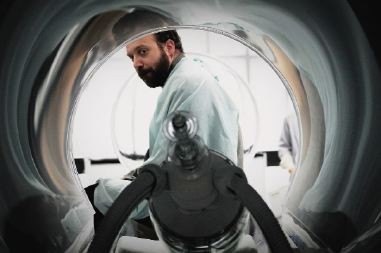Cold Souls

The idea of bartering or battling with the devil for one’s soul is an old one. Cold Souls, a low-budget independent film written and directed by Sophie Barthes, is the first tale I have encountered that deals with soul “storage”—the idea that souls can be removed, stored and transplanted.
Neurotic New York stage actor Paul Giamatti (played by, of all people, Paul Giamatti) finds his soul a burden that makes it difficult for him to play his role in the Chekhov drama Uncle Vanya. He runs across a magazine article about the Soul Removal Institute and later meets Dr. Flintstein (David Strathairn), the upbeat head of the institute, who is equal parts philosopher and used-car salesman. Giamatti goes ahead and has his soul removed (he is horrified to see that it resembles a chickpea). But as he resumes play rehearsals, he realizes that it having no soul is worse than having a burdened soul. This segment includes some humorous scenes in which he plays Vanya as a romantic comedy.
The movie’s own soul is revealed when Giamatti returns to the Soul Removal Institute to reclaim his soul and finds that it has been misplaced. The institute offers him an appropriate loaner: the soul of a Russian poet. This leads to new complications, and the story expands to include the Russian mob, a criminal thug and his actress girlfriend, and a suicidal woman who has also lost her soul.
Though the film loses some of its spiritual depth once the secondary plot lines are introduced, it is saved by the haunting presence of Nina (Dina Korzun), a dead-eyed “soul mule” whose job is to smuggle souls from Russia into the U.S. The job seems straightforward to her bosses (in and out, thanks to a clinical MRI-like device), but it involves some frightening side effects: unfamiliar voices, images and memories float around inside her. Things get even more complicated when Giamatti returns with Nina to the dark and moody city of St. Peters burg in search of his missing soul.
Though Cold Souls is being marketed as a black comedy, there is very little about it that is truly funny beyond the initial set-up. The script has a tendency to repeat joke lines, as if we missed them the first time around (“What do you mean you lost my soul?”). But the film works quite well as a meditation on the soul’s place in art and daily life and on what it might be like to live with another person’s rich or wounded soul guiding us through life.
As these questions were developed, I found myself wishing that a writer/ director with greater experience was in charge—someone like the late Polish director Krzysztof Kieslowski. But Barthes should be applauded for even taking on such a complex conceit. She is helped mightily by cinematographer Andrij Parekh, whose skillful use of shadow and light does a superb job of mirroring the emotions that are churning inside the characters, especially during the sequences in St. Petersburg, which comes across as a city on the River Styx.
Giamatti is excellent, as always. Strathairn is solid, especially in the scenes in which he tries to explain that soul removal is an inexact science. The underrated Emily Watson, who plays Gia matti’s long-suffering wife, does quite well with a performance that is mainly composed of incredulous reaction shots.




